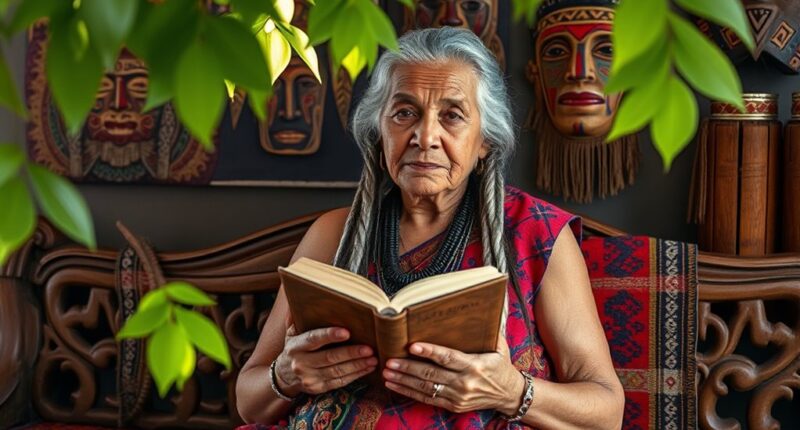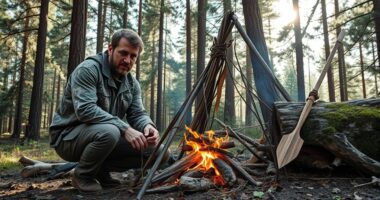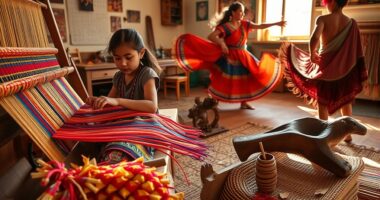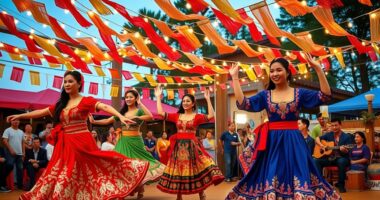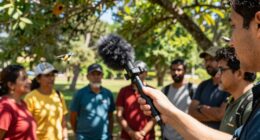As a guardian of cultural knowledge and protocol, elders play a crucial role in preserving traditions, guiding communities, and passing down values that keep cultural identity alive. They act as living bridges between the past and present, safeguarding sacred practices, stories, and rituals. Elders also serve as mentors, ensuring traditions remain authentic and relevant. If you want to understand how their wisdom helps communities stay connected to their heritage, continue exploring their impactful roles.
Key Takeaways
- Elders preserve and transmit cultural traditions, stories, rituals, and language to ensure cultural continuity.
- They safeguard sacred practices and lead ceremonies to maintain authenticity and cultural integrity.
- Elders serve as mentors, guiding community members in social norms and cultural expectations.
- They contribute to community stability by supporting resource management and social cohesion.
- Elders share wisdom and experiences to foster resilience, respect, and the legacy of cultural heritage.
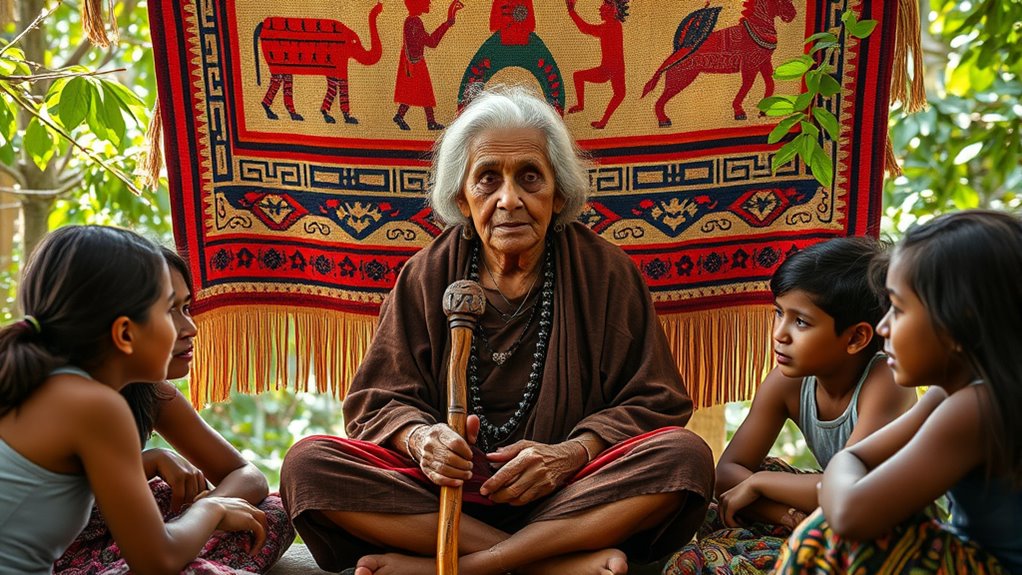
Elders play a vital role in shaping and preserving culture, acting as living bridges between past traditions and current generations. Their wealth of experience and deep understanding of history make them invaluable sources of knowledge. When you listen to elders, you tap into a reservoir of elders’ wisdom that has been passed down through generations, often through stories, rituals, and everyday practices. This wisdom isn’t just about facts; it encompasses values, morals, and the nuances of cultural identity. By sharing their insights, elders help you understand the significance behind customs, ceremonies, and language, guaranteeing that these traditions aren’t lost over time.
Elders pass down wisdom, preserving traditions and cultural identity for future generations.
Cultural preservation hinges on the active participation of elders. They serve as custodians, safeguarding sacred practices, oral histories, and traditional skills that define your community’s identity. When you involve elders in community events or family gatherings, you’re helping to reinforce these traditions. Their role isn’t passive; they often lead ceremonies or teach younger generations how to perform rituals correctly, guaranteeing that the cultural protocols are maintained authentically. Their knowledge of language, songs, dances, and stories keeps cultural expressions alive. Without elders, many of these elements risk fading into obscurity, especially in a rapidly changing world where modern influences can overshadow traditional ways.
You can also see elders as mentors who guide you through complex social norms and cultural expectations. Their guidance helps you navigate your role within the community, fostering a sense of belonging and continuity. They often serve as living textbooks, embodying the history and values that shape your community’s identity. When you seek their counsel or participate in cultural practices they lead, you actively contribute to cultural preservation. This engagement not only honors their role but also ensures that the traditions you hold dear are passed on to future generations. Additionally, elders’ role in asset division and other community resources highlights their importance in maintaining social stability and cultural integrity.
Furthermore, elders’ wisdom extends beyond just tradition; it includes lessons about resilience, respect, and harmony. Their stories of overcoming hardships or maintaining cultural integrity in challenging circumstances can inspire you to value and uphold your cultural heritage. As you learn from their experiences, you become a custodian of your culture, ensuring its survival and relevance. By recognizing the importance of elders’ contributions, you help sustain the rich tapestry of your community’s cultural legacy, making sure it endures for generations to come.
Frequently Asked Questions
How Do Elders Acquire Their Cultural Knowledge?
You acquire your cultural knowledge through intergenerational storytelling, where elders share stories, traditions, and lessons passed down over time. Participating in ceremonial leadership helps deepen your understanding, as you learn the significance of rituals and protocols. By actively engaging in these practices, you absorb cultural values and history, ensuring they stay alive. This ongoing process strengthens your connection to your community and preserves your culture for future generations.
What Challenges Do Elders Face in Preserving Traditions?
You face the challenge of fragile stories slipping away like fading echoes, as intergenerational communication grows strained. Cultural adaptation pressures you to balance tradition with change, risking loss of authenticity. You struggle to keep elders’ voices alive amidst fast-paced modern life, risking the disappearance of sacred customs. Yet, your resilience and efforts to bridge generations help safeguard your heritage, ensuring traditions thrive despite these hurdles.
How Do Elders Decide Who to Mentor?
You decide who to mentor based on mentorship selection, often choosing individuals showing genuine respect, zeal, and willingness to learn about your culture. You also consider bridging generational gaps, mentoring those keen to preserve traditions and pass them on. You look for commitment, openness, and the potential to continue your cultural legacy, ensuring your knowledge stays alive and relevant for future generations.
Are There Variations in Elders’ Roles Across Cultures?
You’ll find elders’ roles vary widely across cultures, reflecting unique traditions and social structures. While some serve as primary custodians of intergenerational transmission, others focus on community harmony or spiritual guidance. This cultural diversity shapes their responsibilities, influencing how they mentor and pass down knowledge. Despite differences, their core role remains the same: safeguarding cultural identity, ensuring traditions thrive through active participation and shared wisdom across generations.
How Is Elders’ Authority Evolving With Modern Society?
You’ll notice elders’ authority evolving due to generational shifts and technological impacts. As younger generations embrace digital tools and new ideas, elders often adapt by sharing traditional knowledge through social media or community programs. While some may see their authority diminish, many still hold essential cultural roles, guiding with wisdom and experience. This dynamic creates a balance where tradition meets modernity, enriching community life and fostering respect across ages.
Conclusion
As you honor the elders, remember they are the roots of your cultural tree, grounding you in tradition and wisdom. Their stories and guidance are the water that nourishes your identity, ensuring it remains strong and vibrant. When you listen and learn from them, you’re tending to a sacred garden, where each shared moment blooms into lasting knowledge. Cherish these guardians, for they hold the keys to your cultural legacy, guiding you through life’s seasons.
